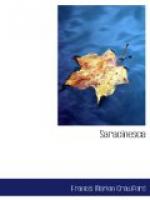It can hardly be said that the Cardinal’s conduct was unjustifiable, though many will say that Del Fence’s secret doings were easily defensible on the ground of his patriotism. Cardinal Antonelli had precisely defined the situation in his talk with Anastase Gouache by saying that the temporal power was driven to bay. To all appearances Europe was at peace, but as a matter of fact the peace was but an armed neutrality. An amount of interest was concentrated upon the situation of the Papal States which has rarely been excited by events of much greater apparent importance than the occupation of a small principality by foreign troops. All Europe was arming. In a few months Austria was to sustain one of the most sudden and overwhelming defeats recorded in military history. In a few years the greatest military power in the world was to be overtaken by an even more appalling disaster. And these events, then close at hand, were to deal the death-blow to papal independence. The papacy was driven to bay, and those to whom the last defence was confided were certainly justified in employing every means in their power for strengthening their position. That Rome herself was riddled with rotten conspiracies, and turned into a hunting-ground for political spies, while the support she received from Louis Napoleon had been already partially withdrawn, proves only how hard was the task of that man who, against such odds, maintained so gallant a fight. It is no wonder that he hunted down spies, and signed orders forcing suspicious characters to leave the city at a day’s notice; for the city was practically in a state of siege, and any relaxation of the iron discipline by which the great Cardinal governed would at any moment in those twenty years have proved disastrous. He was hated and feared; more than once he was in imminent danger of his life, but he did his duty in his post. Had his authority fallen, it is impossible to say what evil might have ensued to the city and its inhabitants—evils vastly more to be feared than the entrance of an orderly Italian army through the Porta Pia. For the recollections of Count Rossi’s murder, and of the short and lawless Republic of 1848, were fresh in the minds of the people, and before they had faded there were dangerous rumours of a rising even less truly Republican in theory, and far more fatal in the practical social anarchy which must have resulted from its success. Giuseppe Mazzini had survived his arch-enemy, the great Cavour, and his influence was incalculable.




